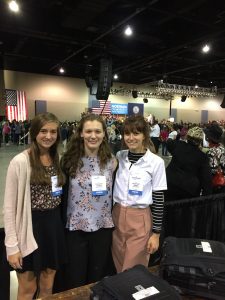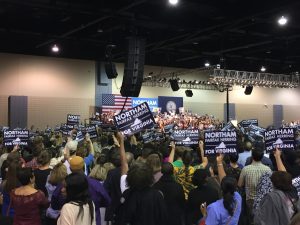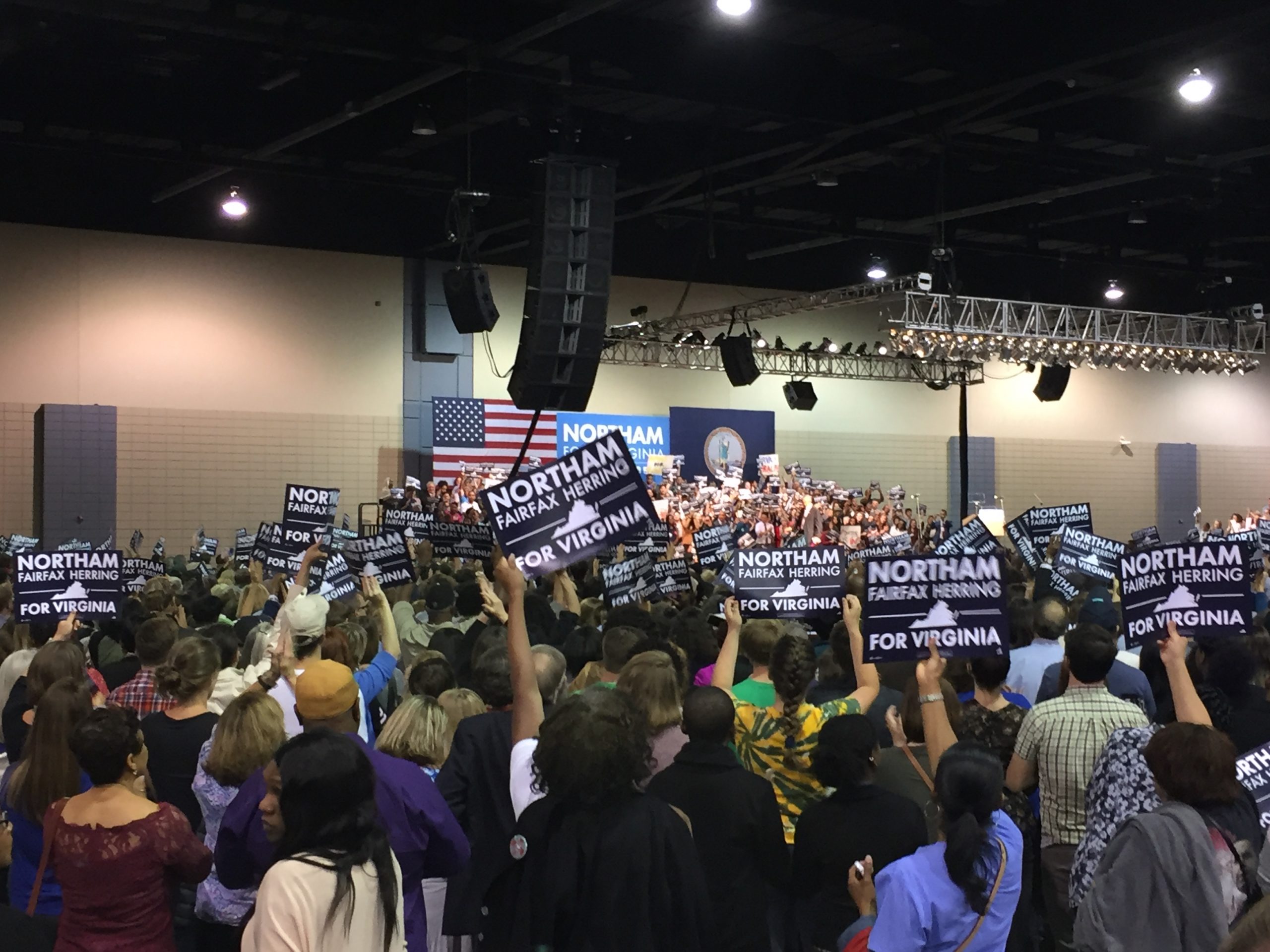As student journalists, editors in chief of the Eagle’s Eyrie, Emma Ford, Sarah York, and Charlotte Zerbst, looked for an opportunity to gain press credentials to the Northam-Obama rally on Oct. 19. I interviewed the three about how they came about this idea, and what their experiences were like.

l to r: York, Ford, and Zerbst sat behind The Washington Post at the Northam rally where former President of the United States, Barack Obama, spoke to the crowd.
How did you accumulate the press credentials for this event?
Charlotte Zerbst: Well, we were sitting around the table, looking at story ideas, and a lot of the ideas said that Obama was coming to Richmond for Northam’s rally, and we continued talking. Then I almost jokingly said “Well I should email Obama, and ask him if we can go as student journalists.” Then the idea just kind of snowballed.
Emma Ford: And then, Charlotte told me, just to cover our bases, to email Northam. She wanted me to email because I have campaigned for him, and also I am of voting age.
CZ: After Emma emailed Northam, we received an email back from a woman named Allison Walter from Northam’s press, and she sent us the information needed.
EF: She told us to fill out a form so that we would be on the official list for press credentials. It was actually kind of crazy because the rally was on Thursday, and we had emailed the week before, and we never got a response so we thought, “Oh, okay, it was fun to try” and then next thing we know, we are on the list.
Sarah York: Yeah, it was like at 11:00 the night before that we got the email.
What was it like to sit around professional journalists?
SY: A lot of the other journalists were pretty young. They were probably like 20-something so I did not feel as different from them, but they all had computers and cameras.
EF: We seemed so naive too because we did not know until we walked into the entrance for press credentials that we actually had the press credentials. So we were just taking a guess that we had them.

Who did you sit close to?
EF: It was really cool because the Washington Post was in front of us. A guy from NBC was to our left, and NPR was to our front left
CZ: The rally was about to start and one of the young guys began typing really hurriedly. Then this older guy in a brown tweed jacket with little circle glasses walks up and the other Washington Post guy jumps out of the seat, and the man sits down and starts editing the story on the spot.
EF: I found it interesting that the reporters from the bigger news networks began disappearing during the rally to gain access somewhere else to get more information about the rally. For example, one girl came running station to station telling us the population of the arena. At one point, she told me, and I told Charlotte and Sarah.
CZ: The guy from NBC then leaned over to me, and asked me what she said, and I told him.
What were some major differences between the environment in the press section, and the environment in the normal rally?
CZ: The big difference was not being able to show any emotion. You are not allowed to clap, you are not allowed to smile, you are not allowed to laugh at what a candidate says. I guess I did not ever really think about that until we were there, and I started clapping, and I quickly realized, “Oh, no, not supposed to do that.”
EF: What also was kind of cool was some of the similarities between what we have been able to do at school, and watching them and how they were able to pull people out of the crowd and interview them which is similar to how we have to interview sometimes.
EF: It was interesting because you almost take up the personality of the environment around you. They were all trying to remain unbiased, and in a way we were not getting extremely hyped up, but we were really listening to what had to be said.
What was your favorite part of the whole experience?
CZ: My favorite part was that it solidified my interest in journalism just because I saw how accessible it was to be around these major news sources like NPR and Washington Post.
EF: I initially was very proud of us. We did this on our own, and nobody was going to hand this to us. We really had to work for it.
What do you feel you learned from this experience?
SY: I learned that anything is possible. When they were first talking about emailing Obama, I said, “Okay, we have work to do right now, we cannot waste time here.” It actually turned into something so I think that anything is possible, and just try it because it could lead to a really cool experience.
EF: I learned that you have nothing to lose by asking because they could have said no, but wee asked and asked and asked. Sometimes it works out and you have these amazing experiences. That was something really important to learn especially in a world like Journalism where sometimes you just have to keep asking until you get the answer.

